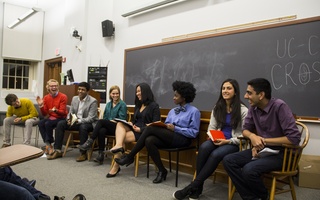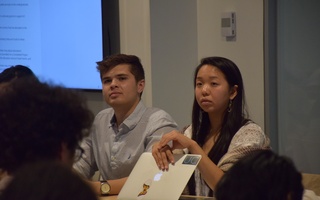{shortcode-9e10230a30b3b643e1dfe5f1876cc6df4dafebe5}
In my first year, I stepped foot onto campus as a pre-med student. My conviction was as steadfast as Harvard’s old brick walls, as concrete as the cheerful chairs wedged permanently into the lawns of Harvard Yard. Sophomore year, however, I moved into my dorm with absolutely no idea of who I was or what I wanted to do. Perhaps my uncertainty developed over the summer, or maybe even all the way back in the winter around the time I first learned that the chairs in the Yard don’t sit there forever. I was left with no sense of direction — which is precisely how one finds themselves walking on the well-trodden path of consulting.
Not knowing what you want to do is terrifying, especially at a place like Harvard where everyone seems to have crawled out of the womb with a ten-year plan. Contrary to the passionate and invigorated energy I expected when I first arrived, many students decide their futures based on the necessity of deciding “something.” Looking back, I realize that even I settled on a pre-med path simply because science was all that I was exposed to, so it just made sense to keep going. I kept going until the day I stopped to ask myself “Why?” and couldn’t find an answer.
This mentality pervades campus culture and compels students to resort to safer paths rather than pursuing genuine interests, a risk that no one can seem to take. Indecisive about your career? Try consulting for a few years until you figure it out. No longer pre-med and suddenly faced with the pressure to decide a new career? No problem; just slide into the recruiting train. It’s what everyone is doing, after all. Consulting has become the new “I don’t know” in response to the big question of the future, essentially replacing the fear of the unknown with the security of a dispassionate job.
It is astounding to me that Harvard, a liberal arts institution that supposedly prides itself on a fulfilling education for the intellectually curious, also acts as a pipeline directly into the corporate sector of finance and consulting. What purpose do these classes about reforming education (United States and the World 35: “Dilemmas of Equity and Excellence in American K-12 Education” — a must-take) or analyzing great works of literature serve if students turn them away for yet another Economics requirement or gems used for scheduled nap times?
In any college or university, but especially within our own brick walls, it’s either pre-med, pre-law, tech, consulting, or finance. Anything else is met with raised eyebrows or “good luck getting a job with that.” Why must anyone be pre-anything? Rather than appreciating college for the rare opportunity to learn whatever we want and to experiment in new fields, we have grown to view this extraordinary institution as a mere stepping stone for a career, a mandatory prerequisite for monetary gratification, and yet another checkbox on the to-do list for a six-figure salary.
Of course, I recognize the legitimate motivations behind secure pre-professional paths. Coming from a humble background, I completely empathize with the high stakes of attaining financial security upon graduation, and indeed, it can be scary not having an answer when someone inquires about your post-graduation plans. However, a six-figure salary is not necessary to lead a fulfilling, financially secure lifestyle. In a society where your career can easily become your life, your paychecks won’t buy you happiness, especially not with a job you hate.
If the sole purpose of Harvard were to shuttle students from high school to a job, then it would call itself a trade school (which is a perfectly valid path post-12th grade). But Harvard isn’t a trade school, so why must we treat it like one? Campus culture is its own being, and while Harvard has definitely played a part in enabling the pre-professional tunnel vision that pervades the student body, that doesn’t mean that we aren’t to blame as well. Every action is preceded by a decision, and every decision is preceded by a thought. Each of us has autonomy over where we choose to take our lives despite the countless career fairs and networking events that may make us feel otherwise.
Then, what can an indecisive college student anxious about the future do? I ask that you don’t be afraid to be afraid. Take that class even though it has no professional relevance to you — take it because you want to and because now is the only time. Join a club for fun rather than just for networking in “x” or experience for “y.” After extensive talks with career advisers, friends, and most importantly, myself, the greatest takeaway I have learned is to be genuine in all that you do, and you will figure things out. The objective of the game is not to come out with a salary; rather, it is to come out with better character, a learned mind, and growth. Coming from Harvard, a career will inevitably follow suit.
Linda Lee ’21, a Crimson Blog editor and Crimson Editorial comper, lives in Eliot House.
Read more in Opinion
Hey! Do You Have a Minute? It’s Me, Your Best Friend!Recommended Articles
-
The Razor's Edge“Enter to grow in wisdom,” the words above Dexter Gate on Mass. Ave. remind me, every time I walk through its pillars, and “leave to better serve thy country and thy kind.” I’d like to imagine that “thy kind,” first and foremost, begins with the individual self.
-
 Around the Ivies: Big Test vs. Big Green
Around the Ivies: Big Test vs. Big Green -
 Hey! Do You Have a Minute? It’s Me, Your Best Friend!
Hey! Do You Have a Minute? It’s Me, Your Best Friend! -
 UC Votes Down $9,600 For Student Dinners and Advising Outings
UC Votes Down $9,600 For Student Dinners and Advising Outings -
 Harvard’s Kindness Problem
Harvard’s Kindness Problem













